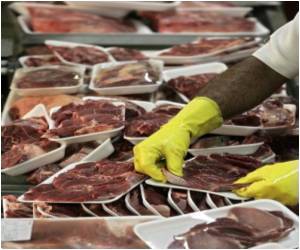The recent dioxin crisis has left shelves in the popular Bio Company store in Berlin's Kreuzberg district virtually bare, as demand for organic meat and egg spiked suddenly.

Demand at the store has rocketed since the scare broke last week, said Silke Unwetter, store assistant. "We have been selling at least twice as much meat and eggs," she said.
"We are having to get in extra deliveries to keep up with demand."
Just around the corner, at the "LPG Biomarket", the empty shelves tell a similar story.
Customer Redmond Nielsen, a 41-year-old garden designer, said he had already changed his shopping habits in light of the crisis.
"I've definitely cut back on buying meat. As for eggs, I always bought free-range before, but now I make sure I buy organic," he said.
Advertisement
At the root of the scandal is a firm in the north of the country suspected of knowingly supplying animal feed manufacturers with fats intended only for industrial use.
Tests have found higher than permitted levels of dioxin, which can cause cancer, in eggs and in three chickens, according to the federal agriculture ministry.
And just as hopes were growing that the crisis had eased, with more than 4,000 farms reopened, it emerged on Tuesday the contamination had spread to pork, one of Germany's favourite dishes.
One Bio Company customer, 55-year-old Jens Ellerbeck, could barely contain his rage at the industry that had allowed this crisis to occur.
"I always buy organic because I simply don't trust the food industry. It's a mafia. They are just criminals," he said.
Margit Beck from poultry market research firm MEG confirmed the anecdotal evidence. "It's certain that people are increasingly reaching for organic eggs," she told AFP, adding there was a "clear drop" in overall egg demand.
And as Germans turn away from battery-farmed produce, fears were growing of a shortage in organic food.
The chairman of the German Federation for Organic Food (BOELW), Felix Prinz zu Loewenstein, said his members were already reporting shortages.
"The market was not very well supplied before the crisis and the chickens are not laying any more quickly," he told AFP.
"I have the feeling that there is an increasing scarcity."
The organic market in Germany is by far the biggest in Europe, with sales of over five billion euros (6.5 billion dollars) in 2008, according to the latest available BOELW figures.
The next biggest market, Britain, is worth two billion euros.
And eggs are the most popular of "bio" products, according to the BOELW, citing a survey showing that 63 percent of organic shoppers put eggs in their baskets, just ahead of fruits and potatoes.
Now with demand for their eggs shooting up, organic producers are scrambling to keep up supply but finding it difficult, said Beck.
"The amount of organic eggs cannot be increased in the short term. There is only a certain number of organic chickens and they cannot work overtime," she said.
Source-AFP











